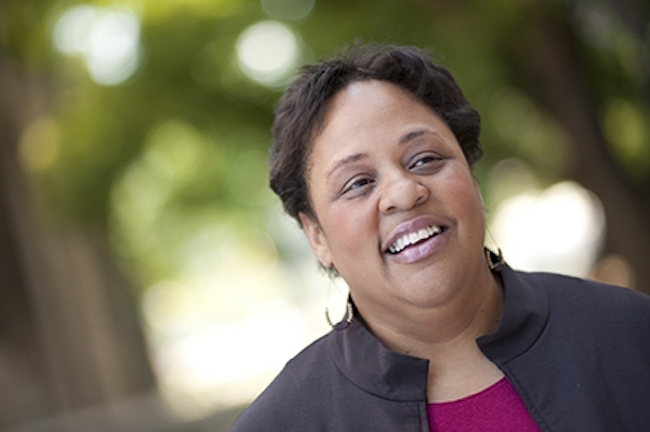Twenty years ago, the University of Pittsburgh’s College of Business Administration was awakening from a long slumber. The undergraduate school had been suspended for many years to focus on building the Katz Graduate School of Business, and the school set about the complicated task of re-establishing a new undergraduate business college.
It opened quietly in 1995 with an inaugural class of 156 students and four majors. By the time long-time Associate Dean Ed Palascak left in 2013, the school had found its footing in the undergraduate management education world, with its own devoted space on campus, enrollment of more than 2,000 students, seven majors, and several business certificate programs. The university’s national search committee looked far and wide for the school’s next associate dean, but ultimately honed in on Audrey Murrell, one of its own, to lead the school as it neared the end of its second decade.
Murrell, an associate professor of business administration at the Katz School and the undergraduate college, was then serving as the director of the school’s David Berg Center for Ethics and Leadership when she was tapped for the role in 2013. In that role, she’d learned to build relationships with companies around such issues as ethics and corporate social responsibility, and Murrell built an impressive portfolio of programs and activities, including a certificate program in ethics and leadership for undergraduate business students. Murell, a faculty member at the school since 1987, also holds secondary appointments in the university’s Graduate School of Public and International Affairs and Pitt’s Psychology Department.
Stepping into the associate dean’s role was a “natural evolution” of what she’d done as director of the Berg Center, says Murrell, and she was eager to use that experience to help the school enhance its national reputation and improve the programming it offered students. “The former dean built a very strong foundation. What that allowed me to do was come in here, benefit from that and say, ‘What can I do that will take us to the next level?’” asks Murrell.
For Murrell, that meant using her expertise in the areas of mentoring and career development to develop innovative leadership development programs for undergraduate students. She’s also revamped the school’s study abroad initiative, added new certificate programs in innovation and entrepreneurship and business analytics and introduced a business honors program for top students.
Much of her time this school year is being devoted to celebrating the school’s twentieth anniversary, a milestone for the young and ambitious school. She’s helping the school celebrate by organizing a series of twenty free anniversary webinars with Pitt Business alums, where they’ll discuss everything from how to make the most out of the first 90 days of your career to what its like to work in Silicon Valley. Murrell will also be taking students to visit five cities with the highest concentration of Pitt alums, in an effort to expand the reach and impact of the school’s growing alumni network.
“I’m just having a year-long party with the students,” she said.
In a wide-ranging interview with Poets&Quants, Murrell speaks about how her research in gender diversity and mentorship is playing out at the business school, how her innovative programming at the school is starting to attract national attention, and how she’s strengthened relationships with the school’s recruiters.
How did you set about changing the undergraduate experience for business students when you first came in as dean?
There is a need, particularly for undergraduate business school students, to have experiences outside the classroom. For us, unlike our master’s level students, they are coming here with limited to zero work experience. We are working with them to get internships, work on projects and work with our corporate partners as early and as often as possible to develop them professionally. We want to give them that experience so they can have an impact as soon as they start their jobs.
To do this, we developed a specific curriculum that has ten competencies we expect them to focus on during their four years to develop them like professionals. We’ve developed specific tools with our corporate partners to do that, and we call it the Outside of the Class Curriculum. We actually looked at organizations’ talent management system, at the competencies they try to develop and the ones they saw universally as important. They include things like leadership development, financial literacy, business acumen, communication skills and civic and social engagement. We try to help the students focus on these in the co-curricular and extracurricular space. We’re trying to make them more focused on what they are doing outside of the classroom.












Questions about this article? Email us or leave a comment below.